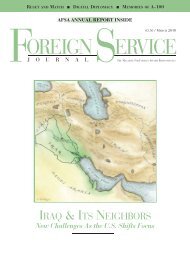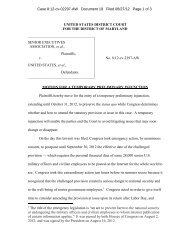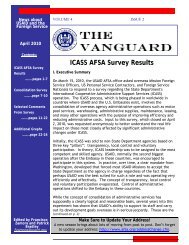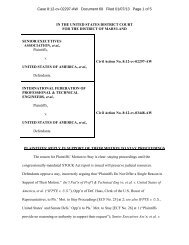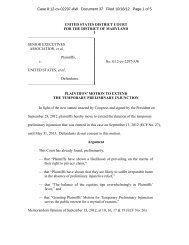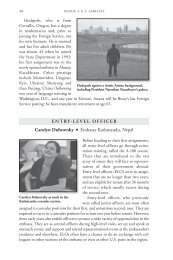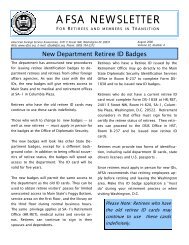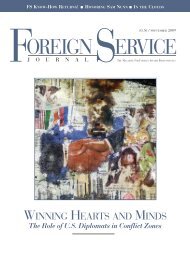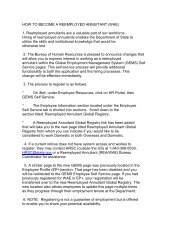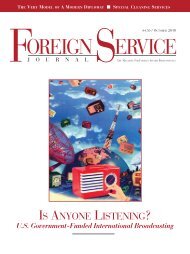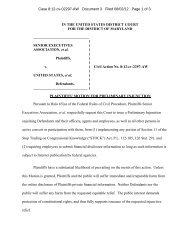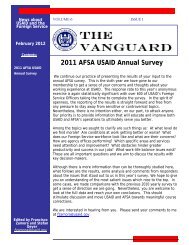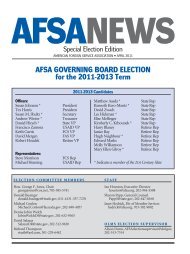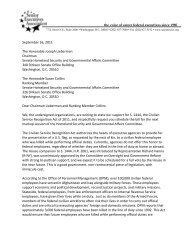F OCUS - American Foreign Service Association
F OCUS - American Foreign Service Association
F OCUS - American Foreign Service Association
You also want an ePaper? Increase the reach of your titles
YUMPU automatically turns print PDFs into web optimized ePapers that Google loves.
What I want to get at is a problem<br />
perhaps more abiding, and that<br />
is, why these men were not listened<br />
to even before they were persecuted.<br />
The burden of their reports taken as a<br />
whole was that Chiang Kai-shek was on the<br />
way out and the communists on the way in,<br />
and that <strong>American</strong> policy, rather than cling<br />
in paralyzed attachment to the former,<br />
might be well advised to take this trend into<br />
account. This was implicit in reports from<br />
officers who had no contact with the communists<br />
but were united in describing the<br />
deterioration of the Kuomintang. It was<br />
made explicit by those who saw the communists<br />
at first hand, like <strong>Service</strong> in his<br />
remarkable reports from Yunan, and<br />
Ludden, who journeyed into the interior to<br />
observe the functioning of communist rule,<br />
and Davies, whose ear was everywhere.<br />
They were unequivocal in judging the communists<br />
to be the dynamic party in the<br />
country; in Davies’ words in 1944, “China’s<br />
destiny was not Chiang’s but theirs.” This<br />
was not subversion as our Red-hunters<br />
were to claim, but merely observation.<br />
Any government that does not want to<br />
walk open-eyed into a quagmire, leading its<br />
country with it, would presumably re-examine<br />
its choices at such a point. That, after<br />
all, is what we employ <strong>Foreign</strong> <strong>Service</strong> officers<br />
for: to advise policymakers of actual<br />
conditions on which to base a realistic program.<br />
The agonizing question is, why is<br />
there a persistent gap between observers<br />
in the field and policymakers in the capital?<br />
While I cannot speak from experience, I<br />
would like to try to offer some answers as<br />
an outside assessor.<br />
In the first place, policy is formed by<br />
preconceptions, by long-implanted biases.<br />
When information is relayed to policymakers<br />
they respond in terms of what is<br />
already in their heads and consequently<br />
50 FOREIGN SERVICE JOURNAL/JULY-AUGUST 2008<br />
Why Policymakers Do Not Listen<br />
By Barbara Tuchman<br />
Editor’s Note: On Jan. 30, 1973, historian Barbara Tuchman was the keynote speaker at an AFSA luncheon honoring Jack <strong>Service</strong> and the other<br />
China hands, including John Paton Davies. Excerpts from her remarks follow; for the full text, see the March 1973 <strong>Foreign</strong> <strong>Service</strong> Journal.<br />
make policy less to fit the facts than to fit<br />
the notions and intentions formed out of<br />
the mental baggage that has accumulated<br />
in their minds since childhood. When<br />
President McKinley had to decide whether<br />
to annex the Philippines in 1898, he went<br />
down on his knees at midnight, according<br />
to his own account, and “prayed to<br />
Almighty God for light and guidance.” He<br />
was accordingly guided to conclude that<br />
“there was nothing left for us to do but to<br />
take them all, and to educate the Filipinos,<br />
and uplift and civilize and Christianize<br />
them, and by God’s grace to do the very<br />
best we could by them, as our fellow men<br />
for whom Christ died.”<br />
Actually the main impulse at work was<br />
the pressure of the “manifest destiny”<br />
school for a stepping stone across the<br />
Pacific, but the mental baggage of a president<br />
in the 1890s required him to act in<br />
terms of Almighty God and the White<br />
Man’s Burden, just as the mental fix of his<br />
successors in our time has required them<br />
to react in terms of anticommunism.<br />
Closer observers than Almighty God could<br />
have informed McKinley that the Filipinos<br />
had no strong desire to be Christianized or<br />
civilized or exchange Spanish rule for<br />
<strong>American</strong>, but rather to gain their independence.<br />
This being overlooked, we soon<br />
found ourselves engaged not in civilizing<br />
but in a cruel and bloody war of repression,<br />
much to our embarrassment. Failure to<br />
take into account the nature of the other<br />
party often has an awkward result. …<br />
This desire not to listen to unhappy<br />
truths — “Don’t confuse me with facts” —<br />
is only human and widely shared by chiefs<br />
of state. Was not the bearer of bad news<br />
often killed by ancient kings? Chiang Kaishek’s<br />
vindictive reaction to unpleasant<br />
news was such that his ministers gradually<br />
ceased to bring him any, with the result<br />
that he lived in a fantasy.<br />
[FSOs’] reports must also pass through<br />
a screen of psychological factors at the<br />
receiving end: temperament, or private<br />
ambitions, or the fear of not appearing<br />
masterful, or a ruler’s inner sense that his<br />
manhood is at stake. (This is a male problem<br />
that, fortunately, does not trouble<br />
women — which might be one advantage<br />
of having a woman in high office. Whatever<br />
inner inadequacy may gnaw at a<br />
women’s vitals, it does not compel her to<br />
compensate by showing how tough she is.<br />
You might cite Golda Meir in objection, but<br />
one gets the impression that her toughness<br />
is natural rather than neurotic,<br />
besides required by the circumstances.)<br />
Proving his manhood was, I imagine, a<br />
factor pushing President Nasser of Egypt<br />
into provoking war with Israel in 1967 so<br />
that he could not be accused of weakness<br />
or appear less militant than the Syrians.<br />
One senses it as a factor in the personalities<br />
of Johnson and Nixon in regard to<br />
withdrawing from Vietnam; there was that<br />
horrid doubt: “Shall I look soft?” It was<br />
clearly present in Kennedy, too; on the<br />
other hand, it does not seem to have bothered<br />
Eisenhower, Truman or FDR.<br />
A classic case of man’s temperament<br />
obscuring the evidence is brought out by<br />
John Davies in his recent book, Dragon by<br />
the Tail. Stalin’s greatest error, he points<br />
out, was to underestimate Chinese communism.<br />
“He was deceived by his own<br />
cynicism. He did not think Mao could<br />
make it because, astonishingly enough, of<br />
his own too little faith in the power of a<br />
people’s war.” …<br />
National myths are another obstacle in<br />
the way of realism. The <strong>American</strong> instinct<br />
of activism, the “can do” myth, has lately<br />
led us into evil that was not necessary and<br />
has blotted the <strong>American</strong> record beyond



